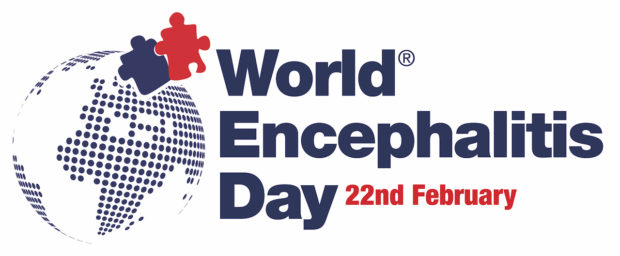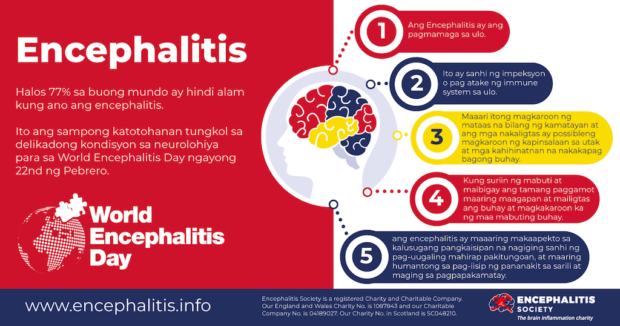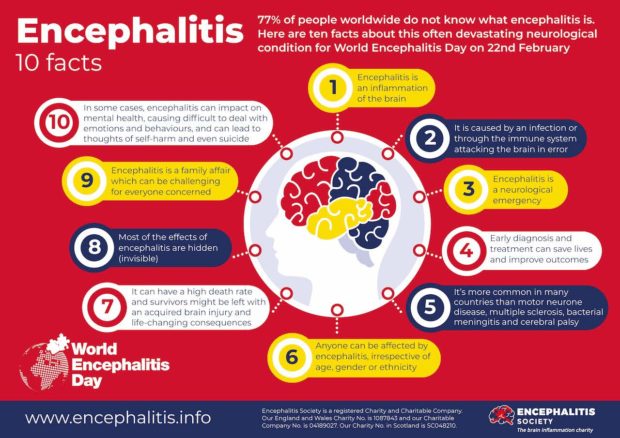Encephalitis patients are at a high risk of suicide and self-harm
Encephalitis patients are at a high risk of suicide and self-harm, two new, ground-breaking research papers, published for World Encephalitis Day 22nd February 2023, have identified.
The two papers, from authors in the UK and Mexico, reveal important statistics relating to suicide, self-harm, and mental health.
The UK paper titled ‘Mental health outcomes of encephalitis, an international web-based study,’ which was written by a team of leading specialists including senior author Dr. Tom Pollak of Kings College London and published on a pre-print platform surveyed 445 respondents from 31 countries and found that 37.5% of survivors of Encephalitis reported they had thought about or attempted (4.4%) suicide.
The summary and recommendation of the paper were; ‘Overall, the large international survey indicates that psychiatric symptoms following encephalitis are common. Overall, these results highlight a need for increased provision of proactive psychiatric care for these patients and represent a call to action for increased research on mental health outcomes of encephalitis so that this patient group can be better supported. Given the treatment-responsiveness of many mental health symptoms and diagnoses, this is likely to represent a global opportunity for reducing morbidity and mortality in this challenging condition.’
While ‘Suicidal thoughts and behaviors in Anti-Nmdar Encephalitis: Psychopathological features and clinical outcomes’ published in the Journal of Neuropsychiatry and Clinical Neurosciences, by a group of leading specialists including senior author Jesus Ramirez-Bermudez, gained data from 120 patients with a headline outcome being 12.5% of patients had suicidal behaviours during early stages of the illness with nearly half (5.83%) carrying out a suicide attempt.
Within the papers’ conclusions it was noted; ‘According to our study, suicidality is not uncommon during the acute phase of ANMDARE, including both first episodes and relapses. Clinicians must be aware of this potentially lethal risk, particularly in those presenting with symptoms of psychotic depression. Although the persistence of suicidal thoughts and behaviors after immunotherapy is rare, we encourage a long-term risk assessment for suicidal and no suicidal self-directed violence throughout the different stages of the disease’.
Both papers have been released in association with the Encephalitis Society to help raise awareness of World Encephalitis Day which takes place on 22nd February 2023.
CEO of the Encephalitis Society and co-author on both papers Dr Ava Easton said: “These impactful and important research papers raise awareness that suicidality can be a not uncommon and serious manifestation of encephalitis in the early stages as a result of the illness, during relapses, and perhaps later in people’s journey of recovery.
“We want anyone affected by encephalitis and mental health problems, including thoughts of suicide and self-harm, to know that symptoms are often highly treatable and help and support are available from the Encephalitis Society wherever they live in the world.
“World Encephalitis Day is a focal point for our global community who have been affected or impacted by Encephalitis. On this very important day we want to project unity, common ground and offer support while we raise awareness.”
Mental Health & Encephalitis
Mental health issues, self-injurious thoughts and suicidal behaviours following encephalitis may occur for a number of reasons: the direct biological effects on the brain of their encephalitis during the early stages when people are very poorly; as a result of disease-related psychological or physical consequences or disability: impaired self-image, limited social life, reduced financial security, dependency on others, pain, substance use; or as an adverse effect of treatments given to help with the encephalitis itself or its consequences.
Psychiatric symptoms and syndromes have been less investigated than neurological deficits and symptoms in autoimmune encephalitis patients which means that these symptoms may likely be underdiagnosed in this patient group. Thus there is a need for more research addressing the breadth, nature, causes and impacts of psychiatric symptoms in patients who have had encephalitis.
A 2020 study in Denmark found that suicide rates in patients diagnosed with a neurological disorder were significantly higher (nearly double) that of people not diagnosed with a neurological disorder (44 per 100,000 person-years compared to 20.1 per 100,000 person-years). In encephalitis specifically they found the suicide rate to be nearly double that of people without the diagnosis of a neurological disorder (39.7 per 100,000 person years).
For more information about encephalitis and World Encephalitis Day, visit www.worldencephalitisday.org
What is Encephalitis?
Encephalitis is an inflammation of the brain. It is caused either by an infection invading the brain (infectious encephalitis) or through the immune system attacking the brain in error (post-infectious or autoimmune encephalitis).
In many countries the condition has a higher incidence than motor neurone disease (MND/ALS), bacterial meningitis and multiple sclerosis (MS) and affects one person every minute globally, ye 77% of people do not know what it is. This lack of awareness leads to delays in diagnosis, treatment and poorer outcomes for patients.
Also on World Encephalitis Day;
In order to shine a light on this important global topic, famous landmarks and buildings around the world will be lit red for World Encephalitis Day. Over 170 landmarks in more than 30 countries including Niagara Falls, the Jet D’Eau in Geneva, BBC Television Centre in London, The Optus Stadium in Australia, and the Dancing House in Prague. For a full list of buildings going #Red4WED, visit https://www.encephalitis.info/wed-landmark
BrainWalk is our fun step challenge which asks supporters to walk, jog, or run as many steps as possible throughout February while raising money for the Encephalitis Society. Individuals and organisations are invited to enter a total step goal for February as they battle it out to the top of the BrainWalk leaderboards. This is a challenge you can take part in wherever you live in the world and whatever your fitness level. To coincide with our World Encephalitis Day campaign, we are encouraging those participating in BrainWalk to walk to their nearest landmark that has been lit up red for encephalitis. If you would like to take part in BrainWalk, please visit https://www.brainwalk.org/.
ADVT.
If you or someone you know is in need of assistance, please reach out to the National Center for Mental Health (NCMH). Their crisis hotlines are available at 1553 (Luzon-wide landline toll-free), 0917-899-USAP (8727), 0966-351-4518, and 0908-639-2672. For more information, visit their website: (https://doh.gov.ph/NCMH-Crisis-Hotline)
Alternatively, you can contact Hopeline PH at the following numbers: 0917-5584673, 0918-8734673, 88044673. Additional resources are available at ngf-mindstrong.org, or connect with them on Facebook at Hopeline PH.


